According to the United Nations data, around 70 billion land animals are slaughtered each year for food. Most of these animals are raised and killed in inhumane industrialized conditions, often suffering terribly. The strategy of raising animals and livestock in large numbers and confining them in small spaces for the duration of their lives is referred to as factory farming.
What Happens at a Factory Farm?
In factory farms, animals are packed in cramped conditions. They are raised to grow quickly so they can be sold and consumed as food. In countries like the United States, factory farming is the primary way popular products like hamburgers, cheese, and eggs are produced and sold. Currently, advocates from a wide range of fields (not just animal rights) are calling for a swift change from the harsh industrial conditions in which animals are raised and slaughtered.
In the past, farmers lacked antibiotics and sanitation procedures needed to keep so many animals healthy when crowded closely together. There weren’t efficient preservation and transportation techniques to ship them in large groups. With the advent of factory farming and scientific advancement, the majority of meat produced globally incorporates technological feats to breed and manage animals in factory farms.
Animals are often treated inhumanely. Routine factory farming practices include separating mother cows from infants, castrating male animals without anesthetics, and prohibiting animals from experiencing the outdoors.
Before they are slaughtered, several procedures take place to save space. Chickens, for example, are debeaked to prevent them from pecking fellow chickens, which would result in injury and even death. A machine with a hot blade can debeak as many as 15 chickens per minute. Cows and pigs are tail-docked, which means removing their tails. This procedure prevents the animals from biting one another’s tails. In cows, tail-docking is performed to ease the milking process for workers.
How are Animals Killed on Factory Farms?
In the United States, the Humane Slaughter Act stipulates that animals are to be rendered unconscious before they are bled or dismembered. However, these regulations are not followed or enforced in factory farms.
For example, before they are slaughtered, chickens are shackled and turned upside down on conveyor belts; this leaves them with broken legs and dislocated hips. The conveyor belt uses shocking techniques like dragging them through electrified water and stunning them before their throats are slit.
At times, the panicked birds experience spasms and miss the bath, and their throats are cut while they are conscious and terrified. Cattle and pigs are often electrocuted or killed using a stun gun with a retractable bolt; the bolt is fired into their brain between their eyes, making them brain dead.
Is Factory Farming Ethical?
Factory farming has detrimental consequences for the environment, the communities we live in, and the health and welfare of animals. Because of the conditions in which animals are kept and slaughtered, factory farming defies the animal welfare philosophy and legislation stipulated by the Humane League. These include freedom from thirst, hunger, and malnutrition; freedom from pain, injury, and disease; freedom from fear and distress; and freedom to express normal behaviour.
The environmental impact of factory farms is of concern as well; it contaminates the air, land, and water around factory farming facilities. It results in a vast amount of hog waste, which is particularly dangerous because it is untreated before being released into the environment and leads to surface and groundwater contamination.
The health of humans and animals also suffers because of the conditions they are in; animals develop antibiotic resistance. Animals are given liberal antibiotics as a preventative measure against illness; they kill most bacteria and leave a few drug-resistant strains. Trace amounts of these may be eaten directly by consumers, resulting in newly formed incurable diseases.
Technological advancement and the desire for cheap meat have turned our era into the age of animal cruelty. But, we all have a choice to stop this by putting an end to the abusive treatment of animals. We can do that by sharing animal equality stories on social media, signing petitions to support brave investigations, or simply choosing to leave animal products off our plates!
Aaron Levinson | Staff Writer




















